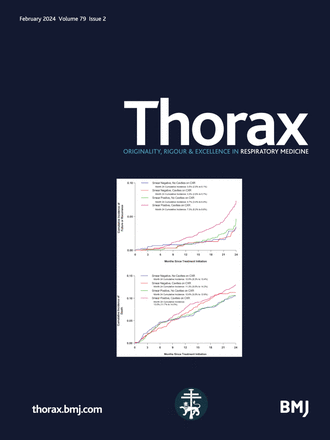Future of academic respiratory medicine: near crisis point
IF 9
1区 医学
Q1 RESPIRATORY SYSTEM
引用次数: 0
Abstract
A crisis is a time of intense difficulty, a turning point when an important change needs to take place. Here, we argue that the UK is approaching a critical point in clinical research capacity, following years of decline in medically trained research staff.1 The British Thoracic Society (BTS) respiratory consultant and trainee surveys (2024) highlighted the problems facing respiratory research. The surveys identified a strong interest in research, but also a lack of opportunities. This editorial outlines the results of these surveys and several initiatives the BTS, National Institute for Health and Care Research (NIHR) and Asthma+Lung UK are taking to revitalise respiratory research. Rates of chronic lung diseases are increasing, with respiratory diseases now responsible for 5 of the top 10 causes of death.2 Despite these challenges, the medical research workforce has diminished. 24% fewer medically trained research staff have been appointed over the last decade. As an overall proportion of the consultant workforce, the number of clinical academic consultants has almost halved to 3%.1 The problem is particularly pronounced in respiratory medicine. Compared with other Western European countries, the UK is an outlier, spending the least on respiratory research. Respiratory medicine accounted for only 4% of the NIHR fellowships (PhD and mid-career) and 3% of NIHR grant awarded in 2023. No respiratory doctors were recipients of the 58 NIHR Senior Investigator awards in 2024.3 The future feels bleak, with more clinical academics over 65 than under 36. This decline is anticipated to accelerate, exacerbated by the challenging financial position that most UK universities are …学术呼吸医学的未来:接近危机点
危机指的是极度困难的时期,是需要进行重大变革的转折点。在这里,我们认为,在经过多年医学训练的研究人员数量下降之后,英国正在接近临床研究能力的一个临界点英国胸科学会(BTS)呼吸咨询师和实习生调查(2024年)强调了呼吸研究面临的问题。调查表明,人们对研究兴趣浓厚,但也缺乏机会。这篇社论概述了这些调查的结果,以及BTS、国家卫生与保健研究所(NIHR)和英国哮喘+肺协会为振兴呼吸研究而采取的几项举措。慢性肺病的发病率正在上升,在十大死亡原因中,呼吸系统疾病占了5个尽管面临这些挑战,但医学研究人员的数量已经减少。在过去十年中,任用的受过医学训练的研究人员减少了24%。作为顾问劳动力的总体比例,临床学术顾问的数量几乎减半至3%这个问题在呼吸内科尤为明显。与其他西欧国家相比,英国是一个异类,在呼吸系统研究上的支出最少。2023年,呼吸医学仅占NIHR奖学金(博士和职业中期)的4%,占NIHR拨款的3%。2023年,没有呼吸科医生获得了58个NIHR高级研究员奖。未来令人感到黯淡,65岁以上的临床学者比36岁以下的多。由于大多数英国大学面临严峻的财务状况,预计这种下降趋势还会加速。
本文章由计算机程序翻译,如有差异,请以英文原文为准。
求助全文
约1分钟内获得全文
求助全文
来源期刊

Thorax
医学-呼吸系统
CiteScore
16.10
自引率
2.00%
发文量
197
审稿时长
1 months
期刊介绍:
Thorax stands as one of the premier respiratory medicine journals globally, featuring clinical and experimental research articles spanning respiratory medicine, pediatrics, immunology, pharmacology, pathology, and surgery. The journal's mission is to publish noteworthy advancements in scientific understanding that are poised to influence clinical practice significantly. This encompasses articles delving into basic and translational mechanisms applicable to clinical material, covering areas such as cell and molecular biology, genetics, epidemiology, and immunology.
 求助内容:
求助内容: 应助结果提醒方式:
应助结果提醒方式:


